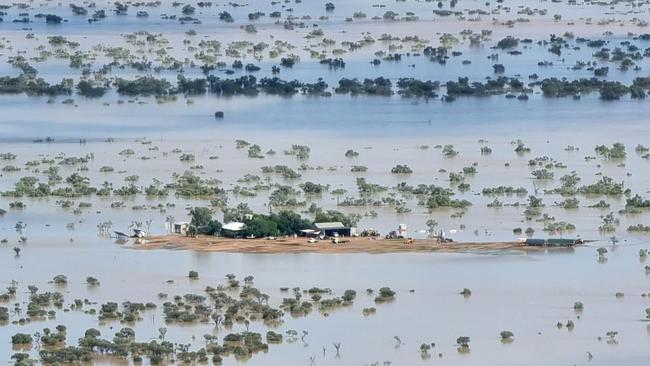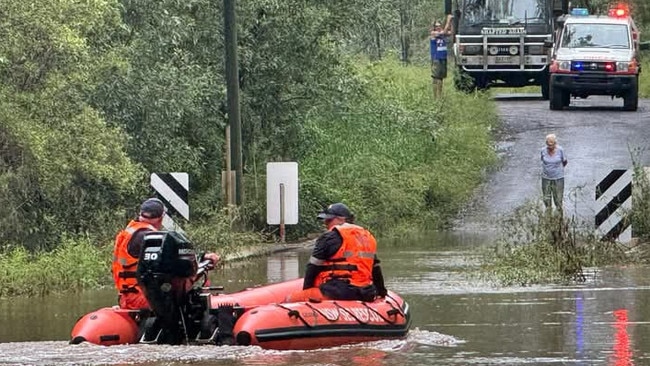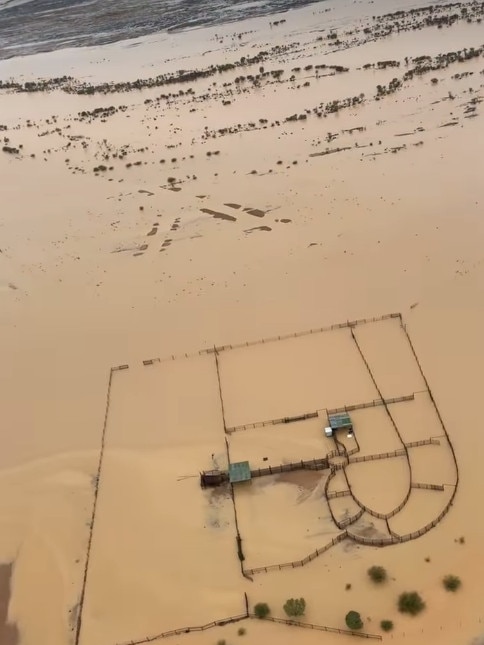Western Queensland towns brace for flooding despite ease in rain
Several towns in central Queensland are ‘inland islands’ as other parts of the state prepare for the worst flooding in 50 years despite a heavy-rain reprieve.

Several towns in central Queensland remain “inland islands” as other parts of the state prepare for the worst flooding in 50 years despite a reprieve in widespread heavy rain.
Many river systems across the state have reached or are expected to reach major flood levels in the coming day, exceeding records set in the 1974 floods.
A temporary levy is being built around the western Queensland town of Thargomindah, more than 1000km west of Brisbane, in preparation for the floodwaters that inundated homes and wiped out livestock of Adavale and Quilpie to the north.
The Bulloo River was rising at Thargomindah on Sunday morning. While the major flood level is 5.50m, the river had already swollen to 6.45m. Modelling is being done to assess how dangerous the weather event could be, with Queensland Premier David Crisafulli warning there is a “real prospect of homes being inundated”.
“Due to the volume of water that is in many of the catchments, a number of communities are yet to see the worst of the flooding event,” he said. “Locals know how long it takes for water to get through to Thargomindah. There is the real prospect of homes being inundated there.”

In the neighbouring area of Eulo, about 130km west of Thargomindah, water had begun to overtop the levee protecting it from the Paroo River on Sunday. It is expected to peak on Monday around 6.5m, about 0.23m higher than the 2010 floods.
Meanwhile, in central Queensland, the regional towns of Jericho, Aramac and Barcaldine, west of Longreach, were all surrounded by floodwaters.
Mr Crisafulli said people had lost everything after water entered places that had previously remained dry. Early estimates suggest tens of thousands of livestock have been killed.
All 20 homes in the town of Adavale have taken on water, while 28 people from the outback town of Jundah – about a third of the population – have been evacuated. Mr Crisafulli said these two locations were of top concern.
“Every property in Adavale will have water in those habitable areas,” he said.
“It will be some time until they are home, and they will return home to a really big mess.
“It is really going to test that community. It is an elderly community; it’s a very tight-knit community, but the level of impact has never been seen like this before.”

Privately-owned helicopters were being used to deliver fodder to surviving livestock.
Mr Crisafulli said it was important “to ensure starvation isn’t a factor” in any more losses.
Additional health staff have been positioned in the affected areas, with extra mental health support on offer.
“There is no doubt that the impact from this event will be felt for some time,” Mr Crisafulli said.
Southeast Queensland avoided the worst of predicted flooding as the slow-moving system moved out to sea on Saturday.
An estimated 140 roads across Queensland were closed by floodwaters on Sunday, including key freight roads in the west and the Bruce Highway near Bowen, in far north Queensland. Six schools will remain closed on Monday.






To join the conversation, please log in. Don't have an account? Register
Join the conversation, you are commenting as Logout